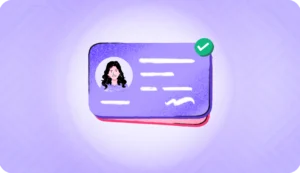ID verification services help online businesses prevent cyber fraud and offer complete security to their customers. Businesses using online ID verification services can confirm the identity of their consumers and ensure that they’re who they actually claim to be.
Consumers typically present two types of IDs to businesses for ID verification purposes. They are paper IDs and digital cards. This blog discusses digital IDs and paper IDs, the differences between the two, and how businesses can seamlessly process these ID types for verification.
What is a paper ID?
Governments issue paper-based identity cards that are valid for both online and offline purposes. Most countries are transitioning to digital IDs. However some countries, like India, still issue paper-based IDs to their residents.
For instance, the Indian government has issued an “Aadhaar Card.” This card acts as proof of identity and address across the country. The government has also issued Permanent Account Number (PAN) cards to identify the taxpayers in the country.
The government states that paper IDs have security features enabled. But they’re hardly enough to prevent fraud. They can be easily duplicated and so, they are risky. Moreover, research says that paper-based IDs put people at a bigger risk of fraud than digital IDs.
Apart from that, paper IDs such as PAN cards don’t have magnetic strips. So it is hard to verify their authenticity.
What is digital ID?
Digital IDs are soft or digitized versions of government-issued authentic IDs. Consumers can use digital IDs for offline and online verification. Users can carry a physical version of the digital ID for offline verification and use the digital copy for online verification.
The information on these cards is machine-readable. It can be verified by MRZ or 2-D codes mentioned at the bottom of the IDs. Also, digital IDs come with additional layers of security, making them fraud-proof. This way, digital IDs are a seamless and secure way of verifying customer identity for online businesses.
Also, digital IDs are beneficial not only for businesses but for consumers too. For instance, customers cannot lose their digital IDs. Even if they lose a physical form of their digital ID, they’ll always have a valid digital copy. And if that gets deleted, consumers can still easily retrieve it from the issuer’s website by entering all the necessary information.
Paper IDs vs. digital IDs
Considering the booming digitization across all business domains and rising threats to consumers’ identity and data, digital IDs are definitely the future of identity verification systems. Also, as ID verification services use machine learning and artificial intelligence (AI) protocols for verifying identities, paper-based IDs are becoming more irrelevant. And all this is turning the weighing scale towards digital IDs.
But what about large countries like India, where billions of people use paper IDs, majorly? How will businesses cater to them for ID verification? Businesses cannot ignore the huge market just because of paper-based IDs. But at the same time, businesses cannot risk the security of their customers by onboarding new users without proper ID verifications or “know your customer” (KYC) norms. So, what should businesses do? Read along to find out.
How can businesses cater to both digital and paper IDs for identity verification?
Yes, paper IDs are insecure and prone to cyberattacks. Verification systems find it challenging to verify consumers’ identities if they’re using paper-based IDs. However, businesses can ensure seamless ID verification, regardless of the ID type, by using innovative ID verification solutions such as HyperVerge.
HyperVerge is an end-to-end identity verification services provider that helps businesses accurately verify customer identities and perform KYC regardless of the document type.
Customers can upload an image of themselves and the images of their paper IDs. And using HyperVerge’s AI-based ID verification system, businesses can verify customer information against government records and perform a liveness check just using a simple image, thanks to HyperVerge’s single image passive liveness technology.
Also, businesses can easily integrate HyperVerge’s identity verification system in their mobile app or website and customize it with code-less integration. And as HyperVerge’s ID verification system is lightning-fast, businesses can ensure faster and more seamless consumer onboarding, which is good for the bottom line.
To learn more about how HyperVerge can help businesses make ID verification a breeze, book a custom demo now!
Read now: Fraud & Spam Prevention Through Digital KYC
FAQs
Is digital ID a good thing?
Of course. Digital ID enables individuals to prove their identity instantly, wherever required, without the fear of losing it.
What is meant by Paper ID?
Paper ID is a paper-based identity verification card that exists only in its physical form, is not machine-readable, and lacks security features, making it prone to fraud.
Why do businesses prefer digital IDs over paper-based IDs?
Paper-based IDs lack an electronic chip, making it harder for businesses to verify and onboard new customers online. On the other hand, digital IDs are machine-readable and can be processed quickly.





